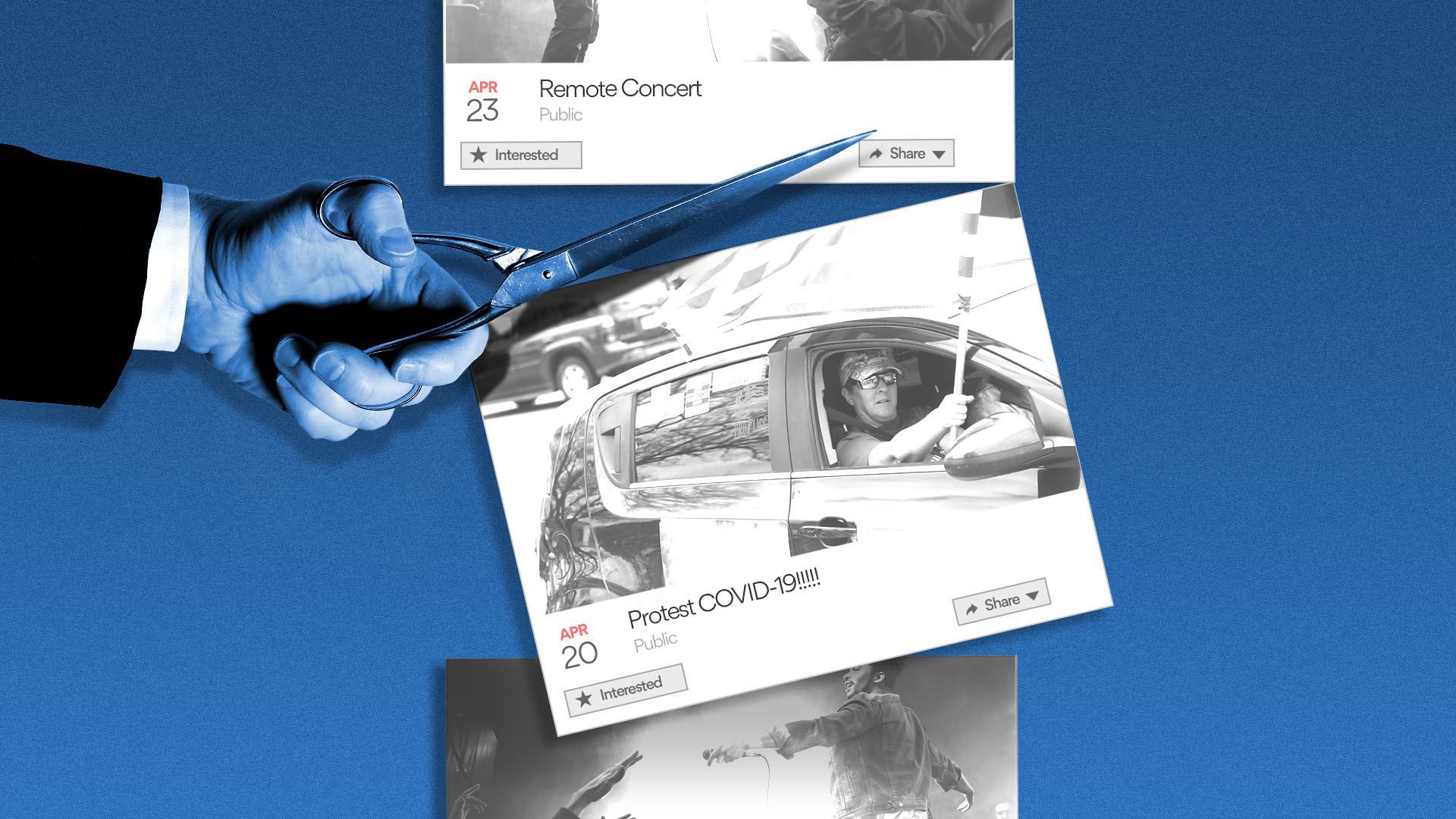Facebook boycott battle goes global
Add Axios as your preferred source to
see more of our stories on Google.

Photo Illustration: Sarah Grillo/Axios. Photo by Jamie Squire/Getty Images
The Madison Avenue boycott against Facebook has quickly grown into a worldwide movement against the content moderation policies of social media giants.
Why it matters: The initial Facebook boycott among advertisers, prompted by Facebook's refusal to fact-check a post by President Trump, has hit a nerve amongst people outside of the marketing community, who think boycotting social media advertising altogether could help to create a healthier internet.
Driving the news: Jim Steyer, the CEO and founder of Common Sense Media, an advocacy organization that's part of the campaign organizing the boycott, tells Axios that the #StopHateForProfit campaign is moving its focus to marketers overseas, where many big brands spend a large portion of their marketing dollars.
- "It will go global because the world will agree with us, we are on the right side of history, period. And Facebook is on the wrong side of history, period, and people know that," Steyer said.
- "You should assume that between me and the other four CEOs [of the non-profits backing the boycott], one or more of us talk to pretty much all CEOs (globally) involved on corporate side."
- Steyer says that the campaign's leaders are not pressuring political campaigns to boycott social media advertising, as they fear that would just leave the field clear for the Trump campaign.
Prince Harry and Meghan Markle have been privately advocating for the #StopHateForProfit campaign, according to multiple sources working closely with the couple.
- Their efforts are a part of their new nonprofit Archewell, which is focused on areas of digital trust and wellbeing.
- Sources say the duo has been instrumental in personally pushing several CEOs of large companies to pull their dollars.
Yes, but: Steyer points to international companies the #StopHateForProfit campaign has already pressured to pull ads, like Unilever and Honda, as examples of how it has motivated companies overseas. But both of those companies, and others, have so far only pulled their U.S. ad budgets from Facebook and other social platforms.
Catch up quick: The pressure to boycott Facebook is primarily being driven by an campaign called #StopHateForProfit, which is being organized by several advocacy groups, including Color for Change, NAACP, Anti-Defamation League, Sleeping Giants, Free Press, and Common Sense Media.
- The pressure campaign first took off when big outdoor companies like The North Face and Patagonia said they would boycott Facebook.
- In recent weeks, hundreds of companies have joined them, causing Facebook to acknowledge to advertisers privately that it was facing a "trust deficit."
- Over the weekend, a slew of big-name beverage companies, like PepsiCo, Coca-Cola, Starbucks, Diageo and Jim Beam, joined the boycott.
Be smart: Most analysts still don't see Facebook facing a revenue crisis from the pullback yet. And at this point, the boycott is getting broader, as some companies choose to halt ads on platforms like Twitter as well.
- With over 8 million active advertisers, a boycott of Facebook by dozens of the world's biggest brands won't sink the company financially, which relies mostly on advertising dollars from a very large number of small and medium-sized businesses.
- "The financial impact is, this is relatively modest," said Rich Greenfield, a media analyst and Partner at LightShed, in a recent Bloomberg TV interview.
- "This is not about the dollars, this is really more about the signaling to the street, spooking investors, continued headline risk. It obviously doesn't look good when major advertisers are pulling," he added.
By the numbers: The top 100 brands on Facebook accounted for less than 6% of all of Facebook's revenue last year, according to data from advertising analytics firm Pathmatics, cited by CNN.
- For millions of small businesses around the globe that can't afford to buy ads on television or billboards — mediums that reach lots of people broadly but have much higher rates — Facebook and its rival Google are two of the most efficient platforms online to market goods and services.
- This is especially true during the pandemic, as many marketing budgets are getting slashed.
The big picture: Brands have boycotted social media platforms before, and earnings afterwards have proven that boycotts, even from lots of big brands, don't typically affect revenue all that much.
- History also shows that social media boycotts don't usually last very long. But they do create a public relations nightmare, and put pressure on tech companies to make changes.
- The question for Facebook is whether the boycotts leave any lasting reputational damage — with more of the public lumping the social network in with cigarette companies and the fossil fuel industry as a purveyor of toxins.
The bottom line: "I think the reality is, this sounds a lot worse than it actually is," said Greenfield.
